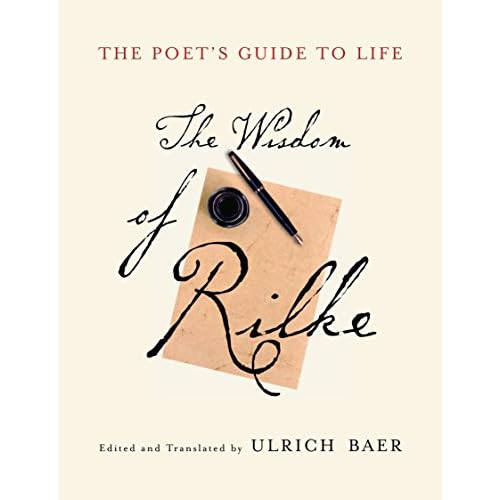 Lately I've been reading a book with the rather unwieldy title The Poet's Guide to Life: The Wisdom of Rilke, edited and translated by Ulrich Baer. It's a collection of passages from Rilke's letters, which apparently comprise many more than just those few to the young poet. In fact, there are an estimated 11,000 extant letters, of which 7,000 are uncopyrighted and available to the public. Ulrich Baer notes in the introduction, "In his last will, Rilke declared every single one of his letters to be as much a part of his work as each of his many poems, and he authorized publication of the entire correspondence."
Lately I've been reading a book with the rather unwieldy title The Poet's Guide to Life: The Wisdom of Rilke, edited and translated by Ulrich Baer. It's a collection of passages from Rilke's letters, which apparently comprise many more than just those few to the young poet. In fact, there are an estimated 11,000 extant letters, of which 7,000 are uncopyrighted and available to the public. Ulrich Baer notes in the introduction, "In his last will, Rilke declared every single one of his letters to be as much a part of his work as each of his many poems, and he authorized publication of the entire correspondence."I've just begun the book, but already I've found some wonders - here are a couple of my favorites, which seem to relate to the experiences of both living and making music:
If we wish to be let in on the secrets of life, we must be mindful of two things: first, there is the great melody to which things and scents, feelings and past lives, dawns and dreams contribute in equal measure, and then there are the individual voices that complete and perfect this full chorus. And to establish the basis for a work of art, that is, for an image of life lived more deeply, lived more than life as it is lived today, and as the possibility that it remains throughout the ages, we have to adjust and set into their proper relation these two voices: the one belonging to a specific moment and the other to the group of people living in it.
Each experience has its own velocity according to which it wants to be lived if it is to be new, profound, and fruitful. To have wisdom means to discover this velocity in each individual case.
The following realization rivals in its significance a religion: that once the background melody has been discovered one is no longer baffled in one's speech and obscure in one's decisions. There is a carefree security in the simple conviction that one is part of a melody, which means that one legitimately occupies a specific space and has a specific duty toward a vast work where the least counts as much as the greatest. Not to be extraneous is the first condition for an individual to consciously and quietly come into his own.


 Technorati Link Count: no. of blog reactions to this post
Technorati Link Count: no. of blog reactions to this post
1 comment:
LOST SON, a new novel based on the life and work of Rilke, has just appeared.
http://www.powells.com/biblio/1-9781932961348-2
www.mallencunningham.blogspot.com
Post a Comment